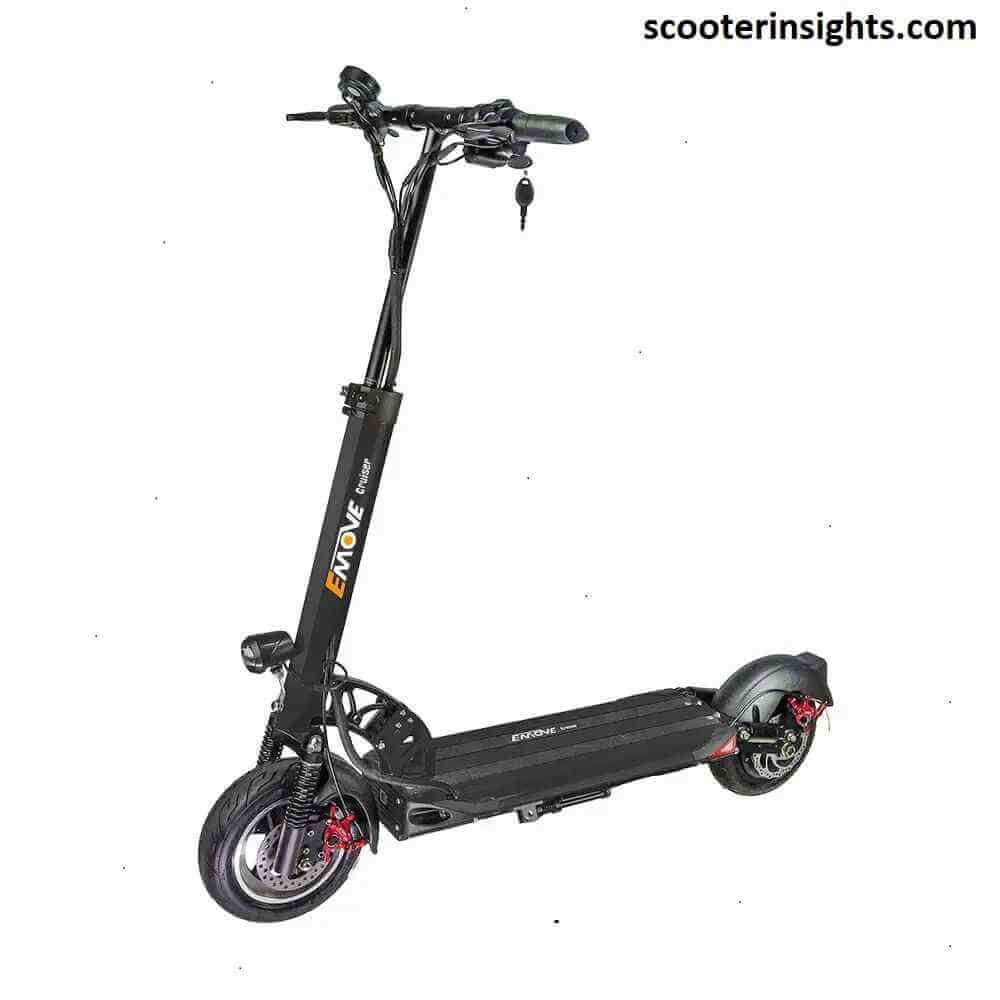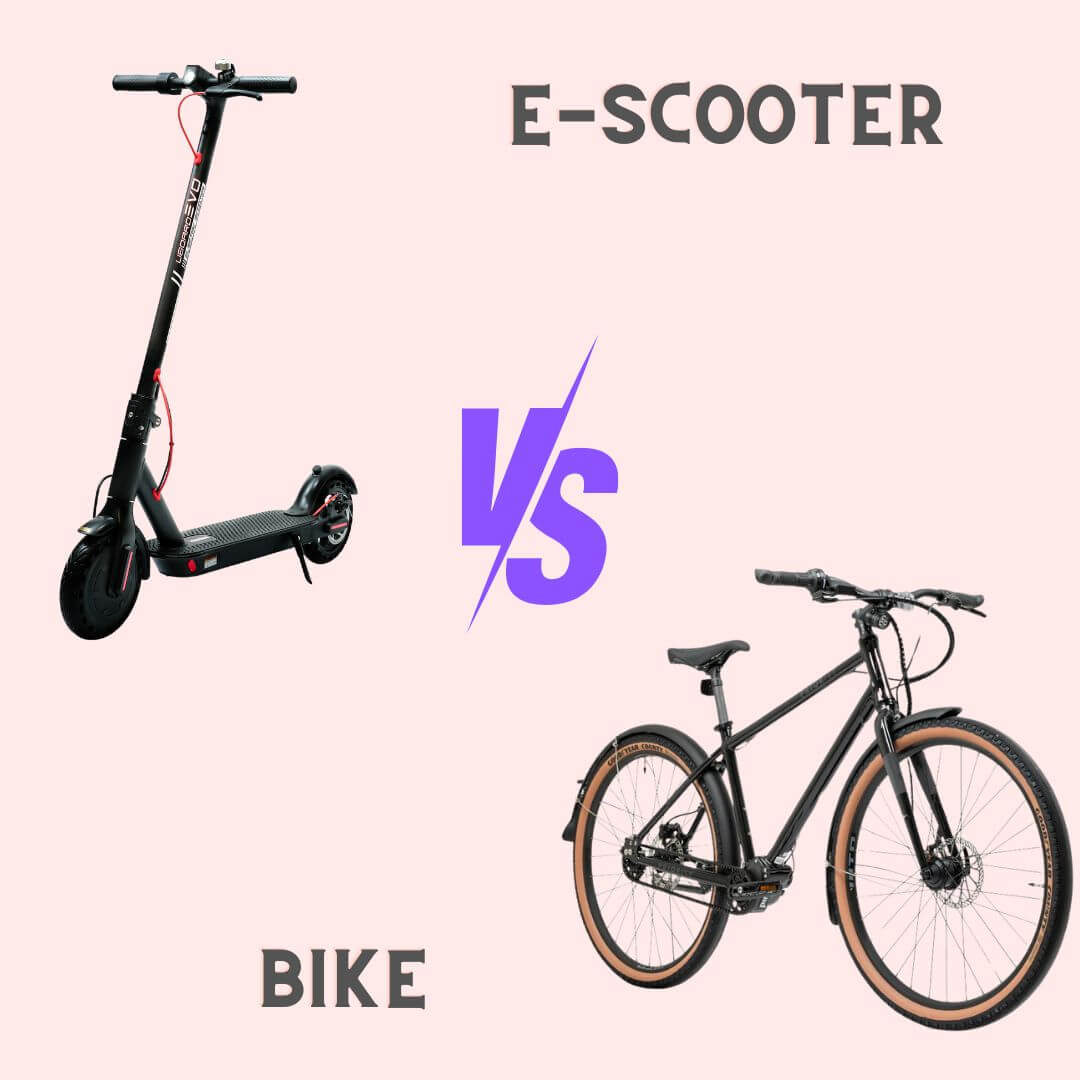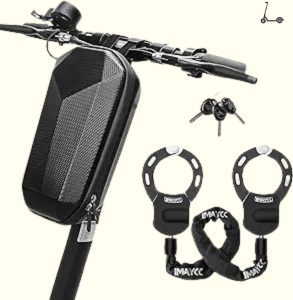Electric scooters and traditional bicycles are both popular choices for personal transportation, each with their own unique advantages and drawbacks. As urban areas continue to expand and the need for efficient, eco-friendly transportation options becomes more pressing, it’s important to understand the key differences between these two modes of travel.
This blog post will compare electric scooters and traditional bicycles across various factors such as convenience, cost, environmental impact, and health benefits, to help you make an informed decision about which option is better suited for your lifestyle and commuting needs.
Check out this All-Rounder Scooter as a Replacement!
EMOVE Cruiser S Electric scooter

Value For Money, Affordable, Convenient & Very Customizable. Long Range & Security Concerned!
33 mph Top Speed, 62-mile Range, 56 lbs, max load 352 lbs, IPX6 Water rating, Foldable, Hybrid Hydraulic brakes, tubeless tires, LCD Display, Key Start ignition, Turn signals, Custom Throttles, Plug-and-Play cabling, 9-12 hours Charge Time.
Use Coupon Code “SCOOTERINSIGHTS” for Free DISCOUNT !!
Table of Contents
The Rise of Electric Scooters and Traditional Bicycles
Electric Scooters
Electric scooters have surged in popularity in recent years, particularly in urban areas where traffic congestion and parking challenges are prevalent. Their compact design, combined with their ability to zip through city streets effortlessly, makes them an appealing option for commuters, students, and anyone looking for a convenient way to get around.
Traditional Bicycles
Bicycles, on the other hand, have been a staple of human transportation for over a century. They offer a perfect blend of exercise, leisure, and transportation. Whether you’re commuting to work, exploring scenic routes, or simply getting some exercise, bicycles remain a versatile and reliable option.
Key Considerations: Electric Scooters vs. Traditional Bicycles
1. Cost
Electric Scooters: Generally, electric scooters come with a higher upfront cost compared to traditional bicycles. Prices can range from $300 to over $1,500 depending on the model and features. Additionally, battery replacements and maintenance costs can add up over time.
Traditional Bicycles: Traditional bicycles are often more affordable, with many good-quality models available for under $500. Maintenance costs are typically lower, although higher-end bicycles with advanced features can also be pricey.
2. Convenience and Portability
Electric Scooters: One of the biggest advantages of electric scooters is their convenience. They are lightweight, often foldable, and easy to carry or store in small spaces. This makes them ideal for last-mile commuting and quick trips.
Traditional Bicycles: While bicycles are bulkier and less portable than electric scooters, they offer the advantage of being able to carry more cargo with accessories like baskets and panniers. For those who value carrying capacity, bicycles may be the better choice.
3. Speed and Range
Electric Scooters: Electric scooters typically have a top speed ranging from 15 to 30 mph and can cover distances of 10 to 30 miles on a full charge, depending on the model. This makes them suitable for short to medium commutes.
Traditional Bicycles: The speed of traditional bicycles depends on the rider’s physical effort and terrain. Experienced cyclists can reach speeds of 20 mph or more. Bicycles have the advantage of unlimited range, as long as the rider has the energy to pedal.
4. Environmental Impact
Electric Scooters: Electric scooters produce zero emissions during use, making them an eco-friendly option. However, the production and disposal of batteries can have an environmental impact.
Traditional Bicycles: Bicycles are one of the most environmentally friendly modes of transportation. They produce no emissions and have a minimal environmental footprint compared to motorized vehicles.
5. Health Benefits
Electric Scooters: While riding an electric scooter requires some balance and coordination, it doesn’t provide the same level of physical exercise as a bicycle. However, it can be a good option for those with physical limitations or those looking for a low-effort mode of transportation.
Traditional Bicycles: Bicycles offer significant health benefits, providing a great cardiovascular workout and helping to build muscle strength and endurance. Regular cycling can improve overall fitness and well-being.
6. Safety
Electric Scooters: Safety concerns with electric scooters include their smaller wheels, which can make them less stable on rough terrain, and their relatively high speeds. Wearing a helmet and following traffic laws are crucial for safe riding.
Traditional Bicycles: Bicycles are generally considered safer due to their larger wheels and more stable frame. However, cyclists still need to be cautious and wear protective gear, especially when riding in traffic.
Use Cases: When to Choose an Electric Scooter vs. a Traditional Bicycle
Electric Scooters
- Urban Commuting: Ideal for navigating congested city streets and reaching destinations quickly.
- Last-Mile Solutions: Perfect for short trips from public transportation hubs to final destinations.
- Convenience: Great for those who need a portable and easy-to-store mode of transportation.
Traditional Bicycles
- Exercise and Fitness: Excellent for those looking to incorporate physical activity into their daily routine.
- Long-Distance Travel: Suitable for longer journeys and exploring scenic routes.
- Cargo Capacity: Ideal for carrying groceries, bags, or other items with the help of accessories.
Conclusion: Which Is Better for You?
The choice between an electric scooter and a traditional bicycle ultimately depends on your lifestyle, preferences, and specific needs. If convenience, speed, and ease of use are your top priorities, an electric scooter may be the better option. On the other hand, if you’re seeking a cost-effective, environmentally friendly mode of transportation that also offers significant health benefits, a traditional bicycle is likely the better choice.
Regardless of your decision, both electric scooters and traditional bicycles provide excellent alternatives to cars, reducing traffic congestion and environmental impact while offering enjoyable and efficient ways to get around.
I’m Arsalan Ahmed, a passionate electric scooter enthusiast and the voice behind this blog. I’m here to share my expertise and insights with you. From in-depth reviews to problem-solving guides, my goal is to help you make the most of your electric scooter experience.











